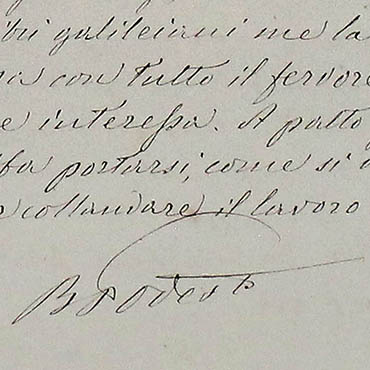Podestà was born at Sarzana in 1820 to a Genoese family of noble lineage. He graduated in Law in Genoa, where he used to help in the state schools and organise amateur plays for recreational and philanthropic purposes and to support the struggles of the Risorgimento. Soon, having taken on the post of advisor in a number of Italian prefectures, he had to leave his native city. Alongside his bureaucratic roles, he undertook historical and bibliographical research, and while he was working at the Imola prefecture, he attended the Deputazione di storia patria per le province di Romagna, earning for his work the public praise of Giosuè Carducci. In 1846 he gave a lecture at the eighth congress of Italian scholars, held in Genoa, in an atmosphere of unitarian urgency.
Taking advantage of his interests, after the suppression of the religious associations, the Ministry of the Interior appointed him as a representative on the commission for the safeguarding of the books and the artistic and antiquarian heritage taken over by the State. He was one of the people responsible for the creation of the National Library in Rome, where he looked after the collections of the suppressed convents and the music library. When he was appointed a librarian, he was made responsible for the special collections; he was named as substitute librarian when the prefect Gilberto Govi left his post to teach in the university. Following serious thefts carried out by some of his subordinates, he was affected by the scandal that resulted. When he asked to be moved, he was given the post of superintendent for the conservation of the manuscripts in Florence, where he remained until his retirement in 1904, apart from a short spell as director of the Biblioteca Medicea Laurenziana.
He did not leave many writings, but his contributions, mainly in the fields of historical bibliography and history of art, were often praised for his skill in dealing with original sources. Baron Podestà died at Sarzana in 1910. He had been superintendent of the manuscripts section of the Biblioteca Nazionale of Florence for the whole period when Antonio Favaro had worked on the edition of Galileo and had also been supportive of Favaro in his earliest research as well, years before Favaro started work on the Opere di Galileo Galilei.


